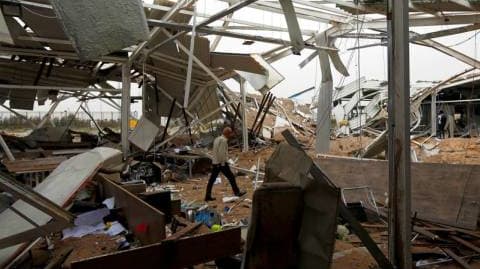
BAGHDAD (Reuters) - Iraq's military condemned overnight U.S. air strikes on Friday, saying they had killed six people and describing them as a violation of sovereignty and a targeted aggression against the nation's regular armed forces.
The military warned the air strikes would have consequences while the foreign ministry said it summoned the U.S. and British ambassadors over the "recent American aggression" and held an emergency meeting to determine what action it would take.
The United States said it carried out the series of strikes on Thursday against an Iranian-backed militia in Iraq that it blamed for a rocket attack a day earlier which killed two American soldiers and a British soldier.
Long-standing antagonism between the United States and Iran have mostly played out on Iraqi soil in recent months.
"The pretext that this attack came as a response to the aggression that targeted the Taji base is a false pretext; one that leads to escalation and does not provide a solution," Iraq's Joint Operations Command said in a statement.
"This action is against the will of the Iraqi state and a violation of its sovereignty, it strengthens outlaws. No party has the right to substitute itself for the state, its sovereignty, or its legitimate decisions."
It said that as well as the six killed, 12 people had been wounded in the U.S. air strikes, and that infrastructure, weapons and equipment at targeted military sites were destroyed.
The Pentagon said the strikes targeted five weapons stores used by Kataib Hezbollah militia, including facilities housing arms used in past attacks on U.S.-led coalition troops.
The Iraqi military statement said that no paramilitary fighters had been killed. It said three soldiers, two policemen and one civilian were killed, according to an initial toll, and that the wounded included four soldiers, two policemen, a civilian, and five militiamen.
The civilians killed and wounded were construction workers at an airport building site in the Shi'ite Muslim holy city of Kerbala, Iraqi religious authorities said.
ATTACKS VIOLATE "PARTNERSHIP", IRAQ SAYS
Around 5,000 U.S. troops remain in Iraq, most in an advisory capacity, as part of a wider international coalition formed to help Iraq drive back and defeat Islamic State militants.
But the Iraqi military statement said the new U.S. air attack went against "any partnership" under the coalition.
It added: "It will have consequences that subject everyone to the most serious dangers if they are not controlled..."
Iran's foreign ministry spokesman said on Friday that U.S. President Donald Trump should blame attacks against U.S. and allied forces in Iraq on their "presence and behavior".
Iranian-backed paramilitary groups have regularly rocketed and shelled bases in Iraq that host U.S. forces and the area around the U.S. Embassy in Baghdad.
For its part, the United States has conducted several air strikes inside Iraq, killing top Iranian general Qassem Soleimani and Kataib Hezbollah founder Abu Mahdi al-Muhandis on Iraqi soil in January.
Many Iraqis say it is they who stand to suffer most from U.S.-Iranian tensions and some, including Prime Minister Adel Abdul Mahdi, have called for U.S. troops to withdraw.
Parliament passed a resolution calling for all foreign troops to leave the country after Soleimani was killed.
The recent air strikes could see those calls renewed.
But populist Shi'ite cleric Moqtada al-Sadr, who says he rejects both U.S. and Iranian influence, urged calm on Friday on account of the "massive disasters" faced by Iraq and the world, an allusion to the spread of coronavirus.
"We are not ones to call for peace with the occupiers but we are being considerate of the circumstances facing the Iraqi people," he said in a statement, alluding to the United States whose troops his militia fought in the past.
Iraq has suffered decades of war, sanctions and sectarian conflict, including the U.S.-led invasion of 2003.
(Reporting by Ahmed Aboulenein; Editing by Nick Tattersall and Mark Heinrich)